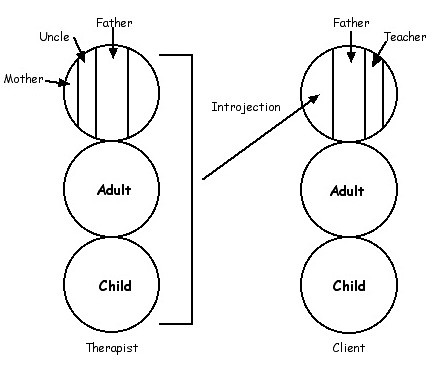Genuiness - Therapist is aware of his own feelings, thoughts and attitudes and these are not concealed from the client.
Empathy - Understanding the client’s experience from the client’s point of view.
Unconditional positive regard - Conveying to the client that they are worthwhile humans no matter what they do.

If these happen then over time this positive relationship is seen to bring alive the person’s natural desire to grow towards health. The Free Child aspect of the personality ‘sparks’ up and the person naturally grows towards psychological health. A reasonable hypothesis that has been widely accepted by the therapeutic community one could say.
However there is another aspect to this. Another feature of the therapeutic process and that is the mechanism of introjection. Any two people who form any sort of relationship then introjection will occur between them. It will happen unconsciously and relentlessly. It will happen to everyone but the extent and rate of introjection can vary between people and circumstances.
The therapeutic environment is a prime breeding ground for introjection of the therapist by the client. It is well designed for this to happen at least in some ways.
Introjection can be explained theoretically as the incorporation of the therapist into the client’s Parent ego state. Over time the client will incorporate the therapist’s personality into their own via this mechanism. The therapist’s personality becomes part of the client’s personality. It will happen back the other way but to a lesser degree.

I recall a number of years ago I used to run a respite programme for an organisation called ARAFMI (Association for Relatives and Friends of the Mentally Ill.) We took away on a holiday 7 people with chronic mental illness so their carers at home (usually their parents) could have one week respite from caring for them. So myself and an assistant lived in close contact with 7 people for a week who usually were diagnosed with either chronic schizophrenia, bipolar or psychotic depression. I tell you what, it was one of the best learning experiences I ever had about these types of mental illness. I learnt more about how they think, feel and function that I ever could with a 5 year degree.
However my point is I lived in close contact with a group who were heavily medicated, had been for a long time and were probably going to be for a long time. Because of the medication many were quite over weight or obese and they generally had this slow moving sort of swaying way of walking. By the end of the week I would be walking like them! Without even knowing it I began to walk like them. The introjection process on display.
In the counselling setting introjection will occur more, the longer the client has been seeing the therapist, the more frequent the client sees the therapist and the stronger the transference the client has for the therapist. The more these three conditions are met the more the client will introject the therapist as part of their personality.

Will these children wear helmets when they ride a bike in the future?
If the therapist is being genuine, empathetic and giving positive unconditional regard then the client will introject that. If the client starts to take this in as part of their own personality then they are going to treat their own Child ego state in these ways as well. If that happens then the person will start to feel better about self and thus grow in a more psychologically healthy way. Another explanation why the Rogers therapeutic approach may be successful.
However unfortunately it works both ways. If a therapist uses painful therapeutic techniques then that attitude or ‘permission’ will be introjected as well. Many therapeutic techniques are painful to some degree and involve the client regressing and experiencing painful emotions and confronting old painful memories. If the therapist allows this to happen and indeed promotes it as most do then the client will introject that into their Parent ego state as shown in the diagram. I use such techniques at times and thus one needs to be cautious of such therapeutic techniques and the introjection that occurs.

Then there are the pharmacotherapies like methadone for heroin addiction. There is an inherent contradiction in these approaches. The therapist says “Take these drugs, so you don’t take drugs”. The permission to take drugs is introjected by the client by the very actions of the therapist. Again, I am not anti methadone and have seen it be useful for some opiate users. However in any over all treatment plan one must be at least aware of this contradiction and introjection occurring in the client.
Graffiti
I admire Carl Rogers, and I believe that the three qualities of which he speaks are very important in a therapist. But what if that is the only person in the client's life who displays those qualities towards the client? How can one person overcome all of the other people who frequently don't show empathy, unconditional positive regard, and genuineness?
ReplyDeleteI find that my therapist is in my head frequently when I am making choices, and I suppose that is the introjection. For example, I was trying to decide whether or not to take a writing workshop, and frankly I was anxious about signing up and having to share my writing with others. Anxious about receiving and giving feedback/criticism, etc. But then I thought, "J, my therapist, won't like it if I don't sign up because I'm anxious and I'll have to tell him about it and see his disappointment." (Even though he probably would never openly show disappointment, he would just encourage me.)
Well, you do kind of rub off onto others you know? You know... that chatty verbose kind of over the top personality of yours. It's lovely but it would be nice to get a word in every now and again.
ReplyDeleteYou tend to brighten up the day.
I also admire and love the work of Carl Rogers.Therapy isnt easy and even with Carl's guidelines dealing with confrontation has its honest moments.
ReplyDeleteTony asked: "Will these children wear helmets in the future?" I predict they will not. They see the adult riding the bike does not wear a helmet and assume that when they are old enough, they won't have to wear a stupid helmet either.
ReplyDeleteHello kenoath,
ReplyDeleteYes it seems true to say that therapy is not easy, even with guidelines from Carl.
Psychotherapy the difficult profession.
Good title for a book that!
However I would say that when i go to work each day i don't feel that it is difficult but also it is not easy like eating ice cream.
I will have to muse on that one some more
graffiti
Now Roses, insults will get you no where!
ReplyDeleteWell maybe the odd one or two might my Aussie friend
Graffiti
*Giggles*
ReplyDeleteHello Harriet,
ReplyDeletei think it is safe to say that the fewer people you relate to that display those qualities then the less imapct they will have. If the therapist is the only one then the impact of that single relationship is going to be minimal.
From what you describe it would seem that there has been introjection by you of your therapist. Good for you
Cheers
Tony
Hello KYLady,
ReplyDeleteI will agree with you that the children will not wear helmets when they grow up and I also agree with you that such helmets are stupid.
The children will introject the non helmet wearing behviour and thus not wear the helmet,
Cheers
Graffiti
Which is exactly why I isolate myself - to stay away from all of those people. It makes perfect sense to me, but my therapist says it isn't good.
ReplyDeleteMaybe your therapist has a reason for saying that Harriet.
ReplyDeletetony
I am curious - do you think the degree of introjection is greater when contact is face-to-face? Could we expect less introjection if people only communicate via phone or Internet? If communicating via Internet, would video technology such as Skype increase introjection in comparison to text chat or email?
ReplyDeleteYes KYLady,
ReplyDeleteOne would expect the process of introjection to occur much more when there is face to face contact. So much more unconscious information is acquired when there is face to face.
Take accents for example. People who live with each other over time start to talk like each other and thus you get different accents in different areas. This could be seen to be introjection. Nobody does this consciously, it is unconsciously acquired.
Skype I think is a huge advance for the internet compared to chat or email in terms of people's ability to communicate via the internet. Certainly from a counselling point of view it is. So introjection would be seen to occur more with skype.
Tony
Maybe he does. I wonder what it could be.
ReplyDeleteWhy don't you ask him Harriet?
ReplyDeleteTony
I don't necessarily agree that the children in the photo won't wear a helmet because their mother (I presume) is not wearing a helmet. My mother and step-father are/were both smokers and alcoholics and I have never smoked and am not an alcholoic.
ReplyDeleteI do agree that I have internalized the voice of my therapist in both positive and negative ways.
I agree Anon,
ReplyDeleteWe are not clones of our parents. The introjection into the Parent ego state represents only one third of our personality. Our Adult ego state allows us to make choices on behaviour that are different from the introjections and the Child ego state decisions are unique from the parental introjections as well.
But the potential is alawys there with such introjections
Tony